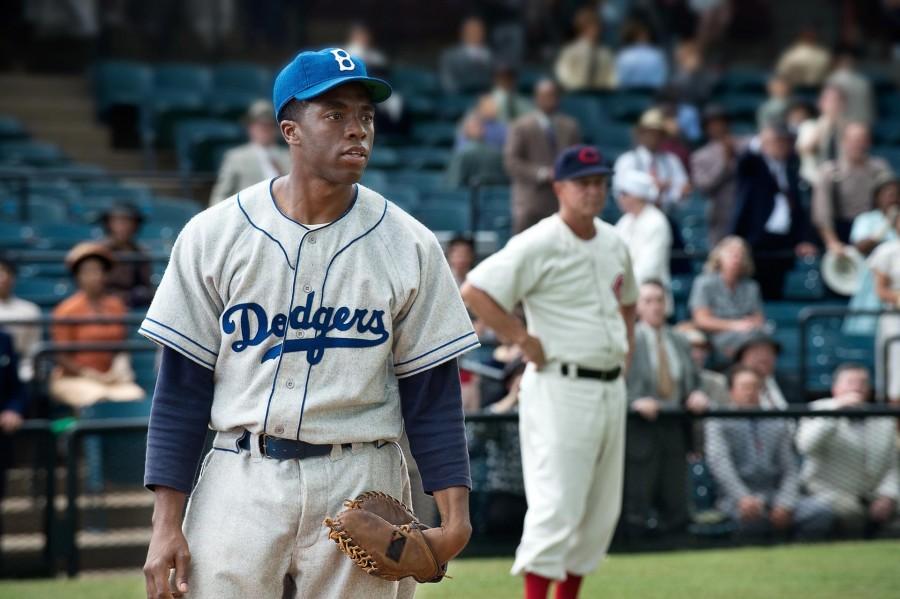The movie 42 was as hyped up as you could possibly make it. It could have been by design. Director Brian Helgeland knew that movies concerning sports such as baseball and historical topics such as civil rights usually appeal to respective audiences. Interestingly enough, however, t’s clear that 42 is demonstrates an effective connection between these two distintive topics.
In the movie, Helgeland attempted to illustrate the story of Jackie Robinson, most notably his baseball career and the ways it impacted his life on and off the field. Helgeland succeeded in his efforts.
42 “The True Story of An American Legend” tells how hard it was for Jackie Robinson to make it as a ballplayer in a white man’s league. 42 shows us the meticulous planning that went into Robinsons legacy. Branch Rickey was the mastermind behind bringing a black man, into the Major Leagues. Rickey wasn’t the first to try such a thing, but he was the first to succeed.
In the movie, Jackie Robinson is shown thriving in the Negro leagues. Then comes a man of Branch Rickey’s assistance to notify Robinson he has been targeted by the Brooklyn Dodgers. In a meeting with Branch Rickey Robinson has his temper tested. Rickey proclaims the famous phrase, “I want a player who has the guts, not to fight back!”
With a movie of such historical significance the actors must be perfect. Little known actor Chadwick Boseman, is an up incoming superstar. He had the privilege of playing Jackie Robinson. But to him, it was more of an honor. He said in an interview that he had a responsibility in this role, to portray for the younger generation the characteristics and lifestyle of a younger Jackie Robinson. Branch Rickey is played by a familiar face… so well it’s actually remarkable the resemblance between the real life Branch Rickey and no other than Harrison Ford.
“This is definitely outside of my normal role of action, but it was a very fun and enjoyable role for me”. Don Newcombe, played with Robinson and was employed by Rickey, so when he was asked how the actors portrayed their characters, he said,” I’m so proud to see this young man [Boseman] perform the way he did, emulating my great idol named Jackie Robinson, my teammate, my ex-roommate, my golfing buddy … When I first saw Harrison, I said, “What is Branch Rickey doing up on that screen?” He looks so much like him and he performed like him and I said, “My God, what do they do in the movie business, they make it almost real.” I’m proud of the both of them.”
42 shows the behind the curtain life of Jackie Robinsons rookie year, from his wife and newborn child, to his relationship in the locker room with some of the other Dodger players. And simple exerts of young black boys running alongside the train Robinson just left on lets us know the importance of Robinsons success to the black community. He denied being anything more than just a ballplayer, but anybody in the black community knew he was a hero.
Besides Robinson’s wife and Branch Rickey, Wendell Smith, was always there. He was a journalist for the black community. He was also Robinson’s chauffer. He protected and documented Robinson’s life. Smith sat beside Mrs. Robinson at every game and wrote on his typewriter which sat on his lap. He gave Robinson the chance to succeed in Major League baseball and in return was given the opportunity to be one of the biggest sports journalists in history. He would go on to become the first black man to be allowed in the press box.
42 is a well-organized documentation of Mr. Jackie Robinson’s legacy, and will be a film that is watched repeatedly for new generations to come. It isn’t to glorify what was done, but to remind us what one man is capable of. What one number can symbolize. What one name can inspire. And how one life, can change the lives of millions.
